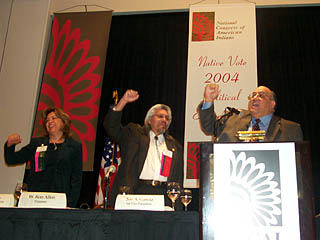
BETTER TIMES: Dave Anderson at the National Congress of American Indians. Febraury 2004.
|
Dave Anderson came to the Bureau of Indian Affairs a year ago feeling happy, healthy and terrific. He leaves the agency next week a changed person but says the experience is one he
will never forget.
"I feel two things," the outgoing assistant secretary said in an interview with Indianz.Com yesterday. "I feel sad that I'm leaving. But I'm also very optimistic about moving forward."
Anderson announced his resignation earlier this week, only a year after joining the Bush administration armed with a positive attitude rarely found in the halls of government. "Some people saw some of the things I represented as being a breath of fresh air," he observed, a view shared by many in Indian Country.
"I think he was one of the bright lights of the administration," said Tex Hall, president of the National Congress of American Indians, earlier this week. "He really wanted to make a difference."
Anderson said he was proud of the "vision" he brought to the agency that serves more than 1 million American Indians and Alaska Natives and more than 550 tribal governments.
He cited his proposals to create leadership academies for Indian students,
a newly-signed agreement to host Boys & Girls
Clubs at BIA schools and a push to improve economic development policy.
Just getting out to reservations to meet the youth and tribal leaders
was an accomplishment in itself, he said.
Yet the outgoing assistant secretary was reluctant to speculate on whether any of his ideas will bear fruit once he leaves next Friday. He was confident that teachers, parents and BIA officials
will carry out the goals but acknowledged the past year has been a particularly difficult one.
"I think to some other people, I scared people because I represented change," he said.
The rocky road he traveled formed the basis of his decision to depart. He confirmed that he felt stymied in his position, suggesting it wouldn't be healthy for him to continue.
"I didn't want to spend the next four years of my life in frustration," he said, pointing out that he turns 52 in May.
Anderson admitted that he made a major misstep early in his career. In March 2004, he stepped away from all federal recognition, gaming and gaming-related land acquisitions, citing his past role as the founder of a casino management company.
Normally, a political appointee only seeks recusal on issues affecting former clients and business interests or -- in the case of the BIA -- one's own tribe. But Anderson said yesterday he was forced to make the bigger leap by others in the Interior Department.
"Those decisions were made for me before I even got there," he announced. "I probably shouldn't have ever signed those things."
"Those were things I was told that I needed to do," he added.
But Anderson said the criticism took away from the real issues facing Indian Country. "We still have many tribes were gaming is not an issue for them," he said. "They are more concerned about
law enforcement, education and the health and welfare of their people, and those are the areas
that I felt I could make a difference."
And that's where Anderson said the BIA faces its own tough road in the years to come. Tribes are growing at an incredible rate but the agency isn't equipped to deal with it, he argued, particularly in the economic development arena.
The problem, he said, goes back to change. "Anytime you have a change agent, there are people who are very protective of their turfs and they don't want change," he said.
"I will say this, that the bureau has to change," he continued. "I believe that the needs of our people, the needs of our tribes are greater than they have ever been before and the bureau is
not set up to meet those needs as we know them today."
After he leaves the BIA, Anderson said he will resume a role in his Famous Dave's chain of barbecue restaurants, a publicly traded company that reported nearly $97 million in revenues.
He expects to develop recipes and serve as the public face to the business he started over 10 years ago next to the Lac Courte Oreilles Reservation in Wisconsin.
"My calling in life is that of a businessman," he said.
Don't expect him to disappear from Indian Country's radar though. He plans to continue to energize audiences of young Natives throughout the nation, and he has already received speaking
invitations from national groups like the Boys & Girls Clubs of America
"It's not like I'm going away," he said. "I'm probably going to be more active."
Dave Anderson was the ninth assistant secretary for Indian affairs.
Relevant Documents:
Dave
Anderson Resignation Letter |
Gale
Norton Response Letter |
DOI
Statement
Relevant Links:
Famous Daves -
http://www.famousdaves.comLifeSkills
Center for Leadership -
http://www.lifeskills-center.org
